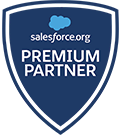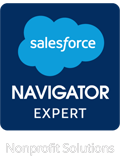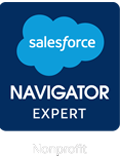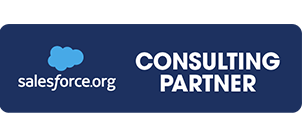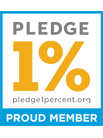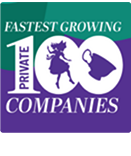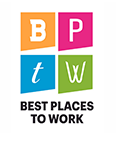111 projects – and it’s still fun
Get to know our Consultants – John Licata
Our CRM Architect John Licata of St. Joseph, Missouri, been working with relational databases for 37 years: CRM systems for 16 years, Salesforce.com for 12 years, and Idealist Consulting for 7 years. As he says on his LinkedIn profile, “Every day I absolutely enjoy helping our clients be successful in their missions. [At Idealist Consulting] we love what we do, our clients think we're fantastic and we have a positive impact on our world every day.”
I recently caught up with John to learn a bit more about how he ended up here. Answers are edited for clarity.
How did you get your start with CRMs?
For about 16 years I was employed by a banking equipment and then by a bank data processing company. This is when I was first exposed to a primitive CRM system, which was at that time simply an electronic rolodex. I started with a DOS system, before Windows…that gives you an idea of how much things have changed! The fundamental objective of using that early system was the same as today’s users of Salesforce.com – managing relationships and fulfilling your commitments. People were as overcommitted back then as they are now, and needed a system to help decide where to put their efforts. CRMs are great for that.
What do you remember about the dotcom days?
After I left the banking industry, I was employed in a sales support position with a small company in New York in an emerging industry - inbound technical support. Our clients included the first dial-up internet providers, Dell, Tivo and Buy.com. I was responsible for implementing a CRM system for our global sales team to deal with prospective clients – we were in a position to be very selective with which “start-ups” we wanted to do business with. We were acquiring new call centers every month and grew from 300 employees to 18,000 in a few short years. It was a wild time. Of course that was right before the dotcom bubble imploded and 50% of our Nashville HQ staff, including myself, were “downsized”. I moved back to Kansas City soon after, worked for a CRM firm for almost two years where I got certified on both the beta version of Microsoft CRM and the first offering of Salesforce.com. After a year, I left and started my own CRM consultancy.
What was Salesforce like in the early years?
Before Salesforce, CRMs had a pretty bad reputation –something like 50% of all the projects completed in the late 90s failed in terms of meeting the purchaser’s expectations. When Salesforce was first introduced there was a huge resistance to “renting software”. Fast forward to 2013, when over 100,000 Salesforce.com enthusiasts are paying to attend Dreamforce, just to learn what’s new and hang out with their peers. I was lucky. I based my consultancy on the Salesforce platform and never looked back.
How did you get involved with nonprofits?
When I first got involved with the Salesforce Foundation’s license donation program, it was not an easy sell. Salesforce was not very well known as a CRM system and nonprofits had never heard of it. “Why would we use a system designed for a sales team,” was the first question most nonprofits asked. The second question was usually something about why is it free, what is the catch? In my first year of working with Salesforce, I heard that Rob [Jordan, Idealist Consulting CEO and Founder] was also working with nonprofit organizations. Many of us “one-man” consulting firms informally agreed to collaborate and if one got a big project, we’d work together.
How have things changed?
The space for business application software has changed tremendously over the years – I realized a while back that if I want to stay relevant I needed to change my mindset and focus more on process and user adoption, while simultaneously staying current with emerging technology. Last year I started building a local team so that I could scale my projects and have more time to focus on client relationships.
What project stands out?
Every year I pick one nonprofit and do a pro bono implementation. This year I decided to offer this to one of my clients – I told her she or someone in her family could pick a nonprofit they’re involved with and my team would do a CRM implementation as a “gift”. We recently started on this project with a nonprofit association in New York City. Both my team and my client’s team will be participating in this project. I get a lot of joy out of “paying it forward” like this and I think my client enjoys an opportunity to step out of her day job and help another org succeed with the same system that they use internally.
What do you find the most satisfying?
CRM implementations usually involve organizational change and are not easy. Over time I’ve learned that the success of a CRM implementation is based mostly on human factors and only partially on technology. A good consultant is also a counselor who understands, recognizes and minimizes the stress involved with change. Having a “professional” relationship does not have to mean “impersonal”. I try to develop as close of a relationship with my clients as they are comfortable with. Many of my clients consider me a friend. In every case, they appreciate that I truly care about their success. The bonus in my work is that I get to improve the world every day.
How many hours and projects have you completed with Idealist Consulting?
8,160 hours and 111 projects to date. AND, it’s still fun.










